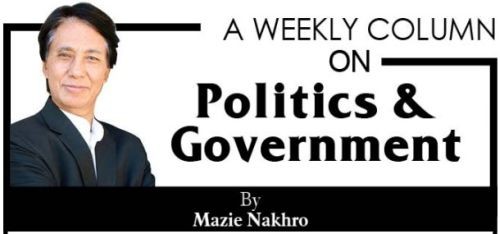
Throughout history, most people have lived in societies in which a small group at the top imposed its will on others. And those at the top would always justify their actions by saying that people are too weak to govern themselves; they need to be ruled. Thus neither in Castro’s Cuba nor in the military regime of North Korea, neither in Iran nor in Saudi Arabia, do ordinary people have much personal choice or political freedom.
Our Naga people, in my opinion, are also slowly shifting towards the autocratic style of leadership. For example, many of our elected leaders are becoming too high-handed and egocentric, not people-centered. And we also like to push them upon a pedestal and call them “dynamic leaders.” My suspicion is that we are applauding such leaders, because they sometimes get things done through the use of their sheer force of personality or some political aura about them. Or, is it just our praise for their charismatic appeal?
To be sure, there’s really nothing wrong with having a strong personality or a charismatic nature. But what about the bullies who impose their strong will into having whatever they want? Or, what about certain salespersons, entertainers, or beauties whose charismatic smiles can even win you over in a minute? Are they to be considered the preferred breeds for leadership? My point is this: strong personality or charisma isn’t enough. A public leader must also possess a strong sense of right and wrong, in addition to depth of knowledge.
Strictly speaking, many so-called “leaders” are just skilled managers. They are concerned with doing things the right way. Their focus is more on efficiency and process, especially routine and standard operating procedures. Leaders, in contrast, are concerned with doing the right thing. Their focus is more on goals, purposes, and a vision for the future. They are able to attract and mobilize people to undertake tasks they could never do on their own. They empower others to accomplish the seemingly impossible. More than that, they enable their followers to become leaders in their own right. They recognize the fundamental wants and needs, including the unexpressed ones, of their followers. By bringing their followers to a fuller consciousness of their needs, they help convert their hopes and aspirations into realities.
Leadership thought of as an engagement among equals can empower people and enlarge their opinions, choices, and freedoms. The answer for building a healthy society lies not in producing a handful of great, charismatic, super-hero-type leaders but in educating a citizenry who can boast that we are no longer in need of such “dynamic leaders”, because we have become a nation of citizens who believe each of us can make a difference and contribute our unique share of strengths towards our common vision.
No doubt, leaders will always be needed. However, our system of government should be designed to prevent strong, autocratic-type behavioral tendencies, lest too much political power be placed in the hands of too few individuals. Our governing system should be such that the potential abuse is checked not only by an involved citizenry but also by the very structure of our constitutional system in the form of separation of powers, federalism, bicameral legislature, checks and balances, and the rule of law.
But what exactly is a Constitutional Democracy? It is a system of government in which the power of political authority is defined, limited, and distributed by a body of fundamental laws called "the Constitution." Under this system, the people are empowered with the means to hold their elected representatives accountable for their decisions and actions while in public office. Thus, the advantage of Constitutional Democracy is this: it transcends the individual personalities and even supersedes political parties. Sometimes a leader, for example, may become too powerful and act according to whims and fancies rather than on constitutional principles. In a situation like that, the people can bring checks on such leaders by invoking established laws in the Constitution. As a matter of fact, the supremacy of the Constitution is such that all national and state officers, including judges, must be bound by oath to abide by the Constitution. This is called the rule of law as opposed to the rule of a strong leader or a strong political party.
In closing, let me repeat my two main points: (1) Constitutional Democracy is to be preferred to a leader-centered rule, and (2) constitutional supremacy is critical for the stability and smooth functioning of any government.






